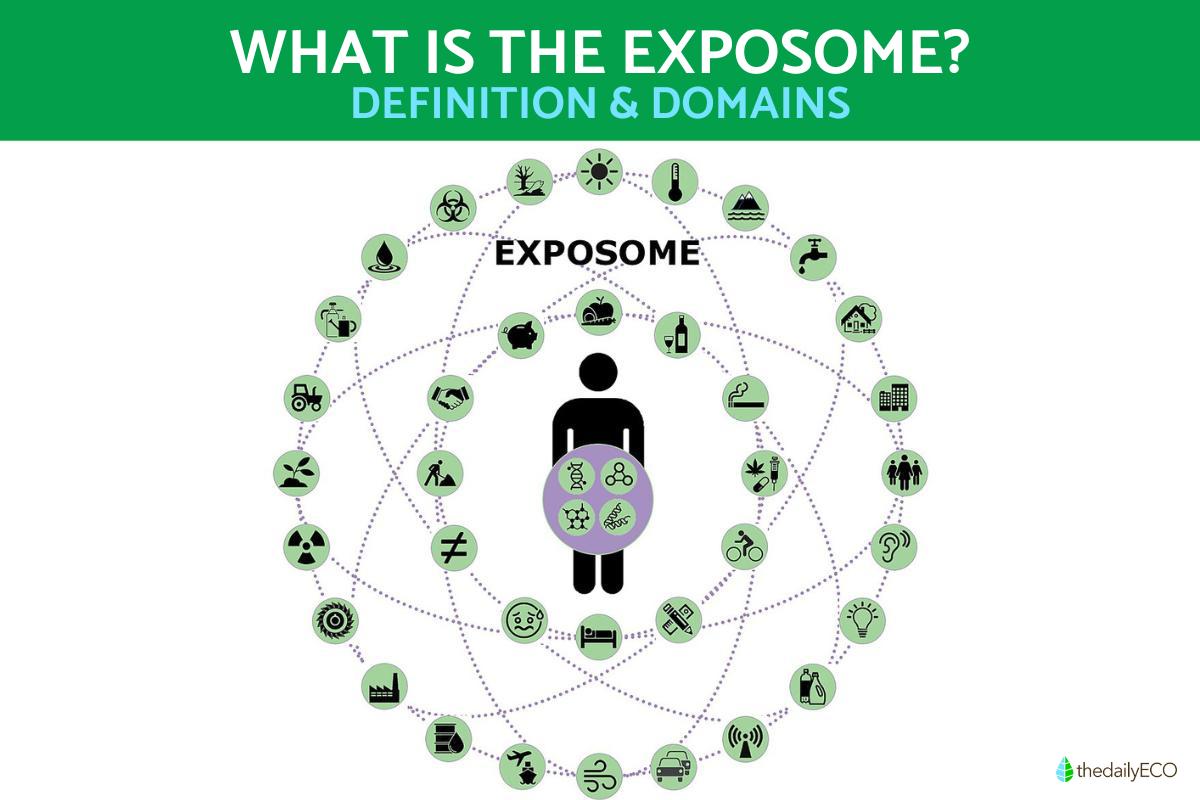What is the Exposome? - Definition and Domains


The exposome is a concept that refers to the cumulative environmental factors to which an individual person is exposed throughout their lifetime. This refers to the time period between birth and death. While it is helpful to understand the negative environmental factors which can harm the human organism, it also includes any positive influences. Our environment affects us both internally and externally, as well as physically and psychologically. The concept of the exposome could be quite nebulous, due to the various levels of environmental impact. For this reason, it is categorized into specific domains.
At thedailyECO, we ask what is the exposome? We provide a definition of the general concept, as well as the specific external and internal domains. We also provide examples of how the exposome affects humans.
What is the exposome?
The exposome is a concept that refers to all those environmental factors to which each human being is exposed throughout their life. It recognizes that the state of our health is determined not only by our genes, but also by the influences of the environment in which we live[1]. These factors include air, water or soil pollutants, as well as biological, psychological and social factors that interact with the organism.
Learn more about how larger ecosystems are affected by these factors with our article on types of environmental impact.
What are the effects of the exposome?
The exposome does not have effects of its own. Instead, it is a way in which the various types of environmental impact can affect the human organism. It is a method of understanding both what the individual influences might be, as well as how these influences interact with each other. In this way, the effects of the exposome include:
- Chronic diseases: exposure to adverse environmental factors such as air pollution, toxic chemicals and chronic stress can increase the risk of developing chronic diseases. They can result in cardiovascular problems, respiratory disease, cancer, diabetes and neurodegenerative diseases.
- Immune response: the exposome can affect our immune response. Exposure to allergens, microorganisms, pollutants and other environmental factors can trigger inflammatory and allergic responses. In turn, this can lead to the development of autoimmune diseases, allergies and disorders of the immune system.
- Development and growth: during the early stages of life, exposure to adverse environmental factors can influence proper development and growth. Malnutrition, exposure to toxic chemicals and stress can affect the development of the nervous system, endocrine system and other biological systems. Many can lead to developmental diseases, as well as long-term health consequences.
- Mental health: chronic stress, exposure to violence, social isolation and other psychosocial factors can contribute to the development of mental disorders such as depression, anxiety and post-traumatic stress disorder (PTSD).
- Reproductive and developmental risks: exposure to certain environmental factors such as endocrine disruptors and chemical pollutants can have negative effects on reproductive health and fetal development. It can increase the risk of infertility, complications during pregnancy and childbirth, birth defects and developmental disorders.
Discover how the environmental impact can harm various ecosystems with our article on types of environmental degradation.

What are the three exposome domains?
The study of the exposome is called exposomics. This can be a difficult discipline to explain. When we refer to the environment, we are referencing so many different factors and influences. Since there is such as diversity of factors which can influence the human organism, it is helpful to categorize the exposome into groups. These groups are known as domains. We can say the exposome is determined by the following three main domains:
- General external exposome
- Specific external exposome
- Internal exposome
Delineating these three domains of the exposome is helpful as it facilitates exposomic study[2]. It allows us to have a better idea of environmental interactions and how they relate to both the individual human and each other. We look at these three domains in more detail below.
General external exposome
The general external exposome encompasses those which affect a lot of people all at once. These are general influences which will effect those in a given environment and include:
- Air Pollutants: the quality of the air we breathe can have a significant impact on our health. For example, exposure to air pollutants can increase the risk of respiratory disease, cardiovascular problems and cancer.
- Water Contaminants: the presence of toxic chemicals in drinking water or water sources can have adverse health effects.
- Soil contaminants: exposure to toxic chemicals in soil, such as industrial waste, pesticides or chemicals released by human activities, can pose a risk to human health. This is especially so if it contaminates food grown in the soil.
- Radiation: exposure to ionizing radiation such as X-rays, gamma rays, and cosmic rays can have negative health effects.
- Microorganisms: we are exposed to a variety of microorganisms in our environment, including bacteria, viruses, fungi and other pathogens.
- Noise: exposure to high and prolonged levels of noise can have negative effects on health, such as stress, sleep disturbances, hearing problems and other related disorders.
- Chemicals and toxic substances: we are exposed to a wide range of chemicals in our environment, both at home and in the workplace. Some of them can be toxic and pose a health risk if inhaled, swallowed or come into contact with the skin.
Many of the factors involve in the general external exposome are related to pollution. Learn about a type of pollution which is often neglected with our article on what is electromagnetic pollution?

Specific external exposome
In comparison to the general external exposome, there are certain environmental influences which are more specific to the individual. This is because the environmental impact is more limited. They include:
- Lifestyle: our daily habits and behaviors have a significant impact on our health and wellbeing. These include diet, physical activity, tobacco use, alcohol use and drug use.
- Socioeconomic factors: our socioeconomic background can have an influence on health. The levels of education and income are important influences on the exposome, as well as occupation and living conditions.
- Social relationships: the quality and support of our family relationships, friendships and work relationships can have an impact on our physical and mental wellbeing.
- Psychosocial stress: stressful life events can be detrimental to our organism. They include financial problems, unemployment, family conflict or trauma. They can even work to lower our immune system.
- Cultural and environmental factors: our culture, values and social norms can influence our health-related behaviors and choices. In addition, the physical environment in which we live, such as the availability of green spaces, air quality and accessibility to health services, can also affect our health.

Internal exposome
The external exposome include the endogenous effects on the human organism such as:
- Metabolites and metabolic products: our metabolism produces a variety of byproducts and metabolites, such as hormones, enzymes and biochemical compounds. These metabolites can have both positive and negative effects on our health, depending on their regulation and balance.
- Endogenous hormones: hormones are chemicals produced by our body that regulate various biological functions. Hormonal imbalances can have significant health impacts, such as endocrine disruption, metabolic disturbances, fertility problems and mood swings.
- Chronic inflammation: inflammation is a normal immune system response to injury or infection. However, the presence of persistent chronic inflammation in the body can contribute to the development of more serious diseases.
- Microbiota: our body is home to a diverse community of microorganisms, such as bacteria, viruses and fungi. These are found primarily in our gastrointestinal tract. These microorganisms, known as the microbiota, play an important role in our health. They aid in digestion, metabolism, immune regulation and vitamin production. Alterations in the composition or diversity of the microbiota may be associated with diseases such as irritable bowel syndrome or obesity.
Currently, research on the exposome is relatively new and constantly developing. In the future, it is hoped that more exhaustive and precise studies in exposomics can be carried out in order to better understand how the different aspects of the exposome interact with each other and on the health of the individual.
Learn more about how we can protect against various environmental influences with our article on what is biosecurity and why is it important?

If you want to read similar articles to What is the Exposome? - Definition and Domains, we recommend you visit our Environment (other) category.
1. Vineis, P., Robinson, O., Chadeau-Hyam, M., Dehghan, A., Mudway, I., & Dagnino, S. (2020). What is new in the exposome?. Environment international, 143, 105887.
https://doi.org/10.1016/j.envint.2020.105887
2. DeBord, D. G., Carreón, T., Lentz, T. J., Middendorf, P. J., Hoover, M. D., & Schulte, P. A. (2016). Use of the "Exposome" in the Practice of Epidemiology: A Primer on -Omic Technologies. American journal of epidemiology, 184(4), 302–314.
https://doi.org/10.1093/aje/kwv325









